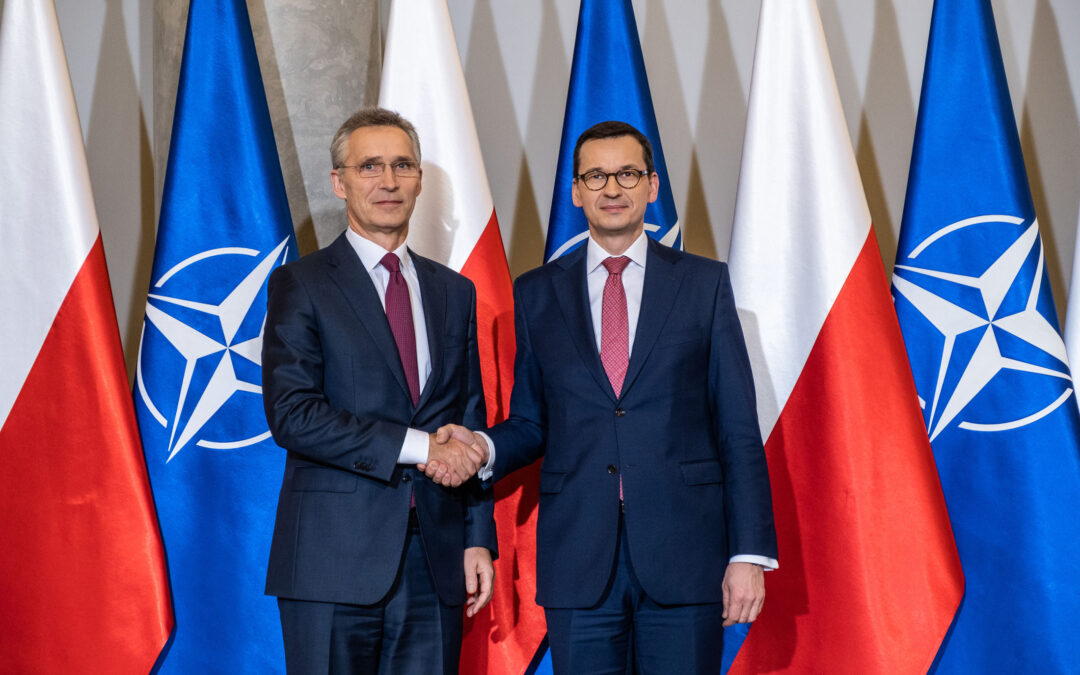Poland is sending a team of over 20 medics to vaccinate around 3,500 members of staff at the NATO headquarters in Brussels this week. Yet, with Poland’s own vaccination programme recently slowing down, and infections rising fast, some have questioned whether the country can afford such generosity.
Prime Minister Mateusz Morawiecki announced on Sunday that Poland had received an “official invitation” to carry out the vaccinations. He said it was an “important mission” to ensure the “operational continuity of NATO Command”, which “provides security for about a billion people in the world”.
“We have always been a loyal and reliable NATO ally,” he added, and “such an invitation means that our partners appreciate the experience and knowledge of our doctors, but also the effectiveness of the Polish vaccination system”.
In response, NATO’s secretary general, Jens Stoltenberg, thanked Poland for its “readiness to support” the vaccine drive and said that Poland was a “strong Ally who has provided support to many other Allies and partners in our joint fight against the pandemic”.
I am grateful to #Poland & PM @MorawieckiM for readiness to support #COVID-19 vaccination at NATO HQ. Solidarity and resilience are at the heart of #NATO. Poland is a strong Ally who has provided support to many other Allies and partners in our joint fight against the pandemic. pic.twitter.com/GxIC92r66E
— Jens Stoltenberg (@jensstoltenberg) March 21, 2021
Since the start of the pandemic, Poland has provided medical assistance to a number of countries and region, including the United Kingdom (to help drivers stuck in Dover), Slovakia, Slovenia and the Vatican, as well as the region of Lombardy in Italy and the city of Chicago in the United States.
Poland has also sent protective equipment to, among others, Iraq, Kosovo, Belarus, Spain, Italy, Georgia and Ukraine, noted Morawiecki.
Yet the latest pledge to provide vaccines to NATO has raised some concern. Wojciech Wilk, head of the Polish Center for International Aid, said that he hoped the vaccines were “from NATO’s supplies and not ours in Poland, considering that we have the largest number of cases ever and the largest number of occupied hospital beds ever”.
The government official overseeing Poland’s vaccination programme, Michał Dworczyk, confirmed that they would be using “AstraZeneca vaccines from our own supplies” to help NATO, reports RMF24.
Mam małą wątpliwość: z jakich zapasów ta szczepionka? Bo mam nadzieję, że z NATO-wskich, a nie naszych w PL – zważywszy, że mamy największą ilość zachorowań ever i największą liczbę zajętych łóżek szpitalnych ever https://t.co/XLahQ7JcLP
— Wojtek Wilk PCPM (@WilkWojtekPCPM) March 21, 2021
Poland last week recorded its second highest ever daily number of new COVID-19 cases, 27,278. The number of patients hospitalised is nearing the peak recorded at the height of the second wave in November and there are more patients on ventilators than at any time during the pandemic.
Media reports over the weekend claimed that, due to a shortage of available beds, some hospitals are transporting COVID-19 patients to other facilities up to 100km away.
Like other EU countries, Poland’s vaccine rollout has been limited by delays in production and delivery of doses from suppliers. Overall, Poland’s vaccination rate is slightly above the EU average, though since early March it has fallen behind other member states.
This is how Poland's vaccine rollout has compared to the EU average since the start pic.twitter.com/PB7x6Xfqd5
— Daniel Tilles (@danieltilles1) March 19, 2021
Main image credit: NATO North Atlantic Treaty Organization/Flickr (under CC BY-NC-ND 2.0)

Maria Wilczek is deputy editor of Notes from Poland. She is a regular writer for The Times, The Economist and Al Jazeera English, and has also featured in Foreign Policy, Politico Europe, The Spectator and Gazeta Wyborcza.




















